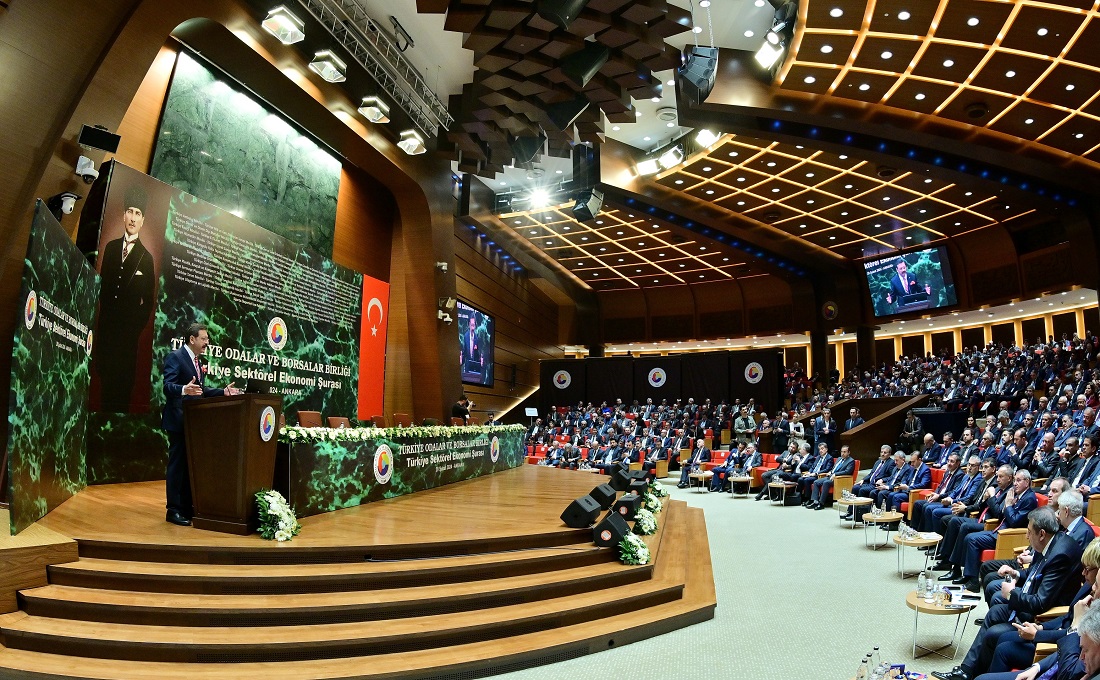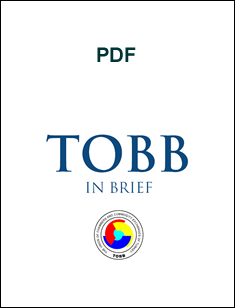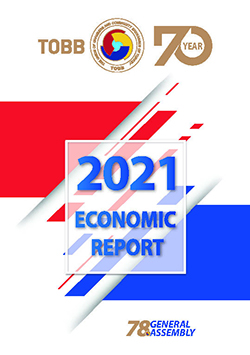TOBB Türkiye Sectoral Economic Council convened

29.02.2024 / Ankara
The Union of Chambers and Commodity Exchanges of Türkiye (TOBB) Türkiye Sectoral Economic Council was hosted by TOBB President M. Rifat Hisarcıklıoğlu with the participation of Vice President Cevdet Yılmaz, Minister of Industry and Technology Mehmet Fatih Kacır, Minister of Labor and Social Security Vedat Işıkhan, representatives of relevant ministries and sector council presidents.
TOBB President M. Rifat Hisarcıklıoğlu, who spoke at the opening of the Council, stated that real sector companies have great difficulty in accessing credit and said, “If we want the abundance of growth to be reflected in all segments, we must support our SMEs and ensure that they have access to appropriate financing opportunities.”
Hisarcıklıoğlu said that the Council is a very important platform that brings together the public and private sectors, where problems and suggestions can be conveyed directly to the executive authority.
Explaining that it is very valuable, very important and gratifying that many of the issues they raised in previous councils have been resolved in the past, Hisarcıklıoğlu said, “We believe that you will bring solutions to the issues we will raise now, as you did in the past. The most important thing for us is to see our state with us, just like today. Of course, we are experiencing some difficulties in the economy. But we do not give up the struggle.”
Hisarcıklıoğlu said that the presence of experienced names at the helm of the economy gives them morale and that they believe that together they will bring the economy to a more solid foundation.
Stating that the growth data announced today also increased hopes for the future, Hisarcıkıoğlu said, “Despite the recession in global economies and the earthquake disaster of the century, the Turkish economy continued to grow in the last quarter of the year thanks to strong domestic consumption and completed 2023 with 4.5 percent growth.”
- “We need to redesign the tax system”
Hisarcıklıoğlu stated that the presidents of the sector councils collected the most demanded issues and prepared solution proposals and listed these proposals as follows:
“Our real sector companies have great difficulty in accessing credit. If we want the abundance of growth to be reflected on all segments, we must support our SMEs and ensure that they have access to appropriate financing opportunities. Second, we need to redesign the tax system, which is becoming more complex every year, making investment and production more difficult. Third, we have the most rigid labor market in the OECD index, including the Scandinavian countries. Everyone suffers from this. Our employers will be able to provide more employment. Our legislation almost discourages this. It prevents our citizens from accessing more job opportunities and earning more. Labor life should be looked at with an approach that rewards employment, not penalizes it. Fourthly, investment permit processes are very complicated. Moreover, our investors do not know and cannot foresee what will happen to them during the investment process, which legislative changes and different bureaucratic approaches they will face. This prevents investments from increasing at the desired pace. Therefore, investment permits and government incentives should be monitored and coordinated from a single point. Fifthly, we must solve the problem of investment location in order to pave the way for investments.”
- “A new industrial basin should be planned in the Central Anatolia-Eastern Mediterranean belt”
Drawing attention to the distribution of industrial investments in the country's surface area, Hisarcıklıoğlu continued his words as follows:
“In Germany, 4 percent, in Italy 2.8 percent, and even the OECD average is 2.4 percent. In order to survive in global competition, our industry operates in an area that is one tenth of its global competitors. A master plan for increasing industrial land should be prepared and financing solutions for land purchase and building construction should be developed. Thus, our industrialists should utilize their limited capital by investing in more productive areas. In this context, a new industrial basin should be planned in the Central Anatolia-Eastern Mediterranean belt.”
- “We trust our ministers' executive and reformist way of doing business”
Hisarcıklıoğlu reminded that there was a very large earthquake last year, which is considered the “disaster of the century”, and said, “With the new industrial basin, we can reduce the risk in Marmara on the one hand, and at the same time, we can open up space in Marmara for high-tech and higher value-added investments.”
Hisarcıklıoğlu underlined that the business world wants predictability above all and expects a road map for the future:
“We believe that the Medium Term Program, prepared under the leadership of our Vice President, Mr. Cevdet Yılmaz, is also very important for making business plans and moving forward with confidence. Thanks to him, as someone who always attaches importance to consultation and common sense, he has always met with us, including on this issue, and received our opinions and suggestions.
We are ready to run, work and produce. Allah willing, we will overcome all difficulties and continue on our way. We will continue to produce and labor to make our country stronger, richer and more prosperous.”
- Vice President Cevdet Yılmaz
In his speech at the opening of the Council, Vice President Cevdet Yılmaz said that the Investment Environment Improvement Coordination Board (YOIKK), which includes representatives of relevant ministries and the private sector, has prepared a 57-article action plan and plans to announce it tomorrow.
Stating that they see all meetings where they take the pulse of the business world under the roof of TOBB as an opportunity to strengthen the economic structure together with stakeholders, Yılmaz said that they see TOBB as the kitchen of reforms regarding the economy and trade in line with the perspective adopted by President Recep Tayyip Erdoğan for 21 years.
Yılmaz stated that they prepared and implemented their road maps, especially the Medium Term Program (MTP) covering the 2024-2026 period and the 12th Development Plan covering the 2024-2028 period, in consultation with the representatives of the business world.
Explaining that they are also shaping their structural reform agenda in line with the feedback and expectations of the representatives of the business world, Yılmaz said that the issues to be voiced by the sector representatives who undertake production, employment, investment and exports in all corners of Türkiye are extremely valuable and important for them.
Yılmaz stated that they always support sector representatives and said, “We are determined to increase our country's gains in the fields of economy and finance and to look to the future with confidence with our vision of the Turkish Century. With a century of experience, we will carry our country further together with the public and private sectors.”
- “We are implementing policies that will enable sectors to see the future more clearly”
Stating that the weak course in global growth continued with the ongoing effects of the Covid-19 outbreak and the Russia-Ukraine war, Yılmaz said that geopolitical risks increased the volatility of prices and risks.
Emphasizing that in the World Bank's Global Economic Prospects Report published last month, the global growth expectation for 2024 remained unchanged at 2.4 percent and for 2025 was reduced by 0.3 percentage points to 2.7 percent, Yılmaz said, “In such a global climate, we have been implementing policies that reduce uncertainty in our economy since last year and that all sectors can see the way ahead more clearly. We are working to fight inflation, ensure fiscal discipline, stabilize growth, reduce the current account deficit and strengthen our reserves.”
Stating that many economic data are expressed in terms of national income, Yılmaz said, “Now that our national income has been revealed, we have revised some of our data accordingly. According to our initial calculations, we have a national income exceeding 1.1 trillion dollars, based on the latest figure. For the first time in our history, we have exceeded the 1 trillion dollar level and we have also exceeded the 1.1 trillion dollar level. Thus, we have reinforced our position as the 17th largest economy in the world in nominal terms. We also maintain our 11th position in purchasing power, of course. In proportional terms, the current account deficit is a critical issue for us. In the middle of last year, our current account deficit was up to 60 billion dollars. At the end of the year, it declined to 45 billion dollars. We see that the ratio of the current account deficit to national income fell by 4 percent. This was exactly the forecast we made in the Medium Term Program. We see that this prediction has come true.”
The Council continued closed to the press after the opening speeches.
Your message has been sent
Thank you |
News Title |




